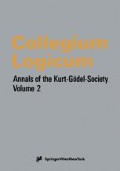Abstract
We consider three types of Turing machines defining functions on infinite words and investigate some characteristic properties of these types of Turing machine mappings. Using the interpretation of infinite words as the expansions of numbers we obtain three classes of real respectively complex numbers. We prove that the three classes of complex numbers form algebraically closed subfields of the field of complex numbers.
Access this chapter
Tax calculation will be finalised at checkout
Purchases are for personal use only
Preview
Unable to display preview. Download preview PDF.
References
S. Eilenberg: Automata, Languages and Machines, Vol. A ( Academic Press, New York, 1974 ).
R. Freund: Real Functions and Numbers Defined by Turing Machines, Theoret. Comp. Sci. 23 (1983) 287–304.
M. L. Minsky: Berechnung: Endliche und unendliche Maschinen (Verlag Berliner Union, Stuttgart, 1971 ).
H. Rogers: Theory of Recursive Functions and Effective Computability (McGraw Hill, 1967).
A. Salomaa: Formal Languages ( Academic Press, New York, 1973 ).
L. Staiger: Hierarchies of Recursive w-Languages, J. Inform. Process. Cybernet. EIK 22 (1986) 5 /6, 219–241.
L. Staiger: Sequential Mappings of w-Languages, RAIRO Infor. Théor. Appl. 21 (1987) 2, 147–173.
L. Staiger and K. Wagner, Rekursive Folgenmengen I, Z. Math Logik Grund-lag. Math. 24 (1978) 523–538.
K. Wagner: Arithmetische Operatoren, Z. Math Logik Grundlag. Math. 22 (1976) 553–570.
K. Weihrauch: Computability ( Springer-Verlag, Berlin, 1987 ).
K. Weihrauch: A simple Introduction to Computable Analysis, Technical Report 171, Fernuniversität Hagen, 1995.
Author information
Authors and Affiliations
Rights and permissions
Copyright information
© 1996 Springer-Verlag/Wien
About this paper
Cite this paper
Freund, R., Staiger, L. (1996). Numbers Defined by Turing Machines. In: Collegium Logicum. Collegium Logicum, vol 2. Springer, Vienna. https://doi.org/10.1007/978-3-7091-9461-4_8
Download citation
DOI: https://doi.org/10.1007/978-3-7091-9461-4_8
Publisher Name: Springer, Vienna
Print ISBN: 978-3-211-82796-3
Online ISBN: 978-3-7091-9461-4
eBook Packages: Springer Book Archive

